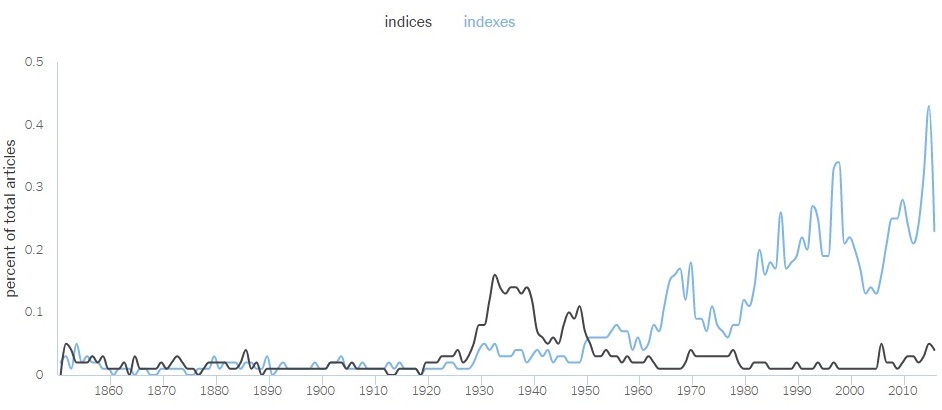What do you do when you have a lot of work to get done and are already past your hoped-for bedtime?
Look up random facts online, of course.
You know when you pronounce a word one way and the person you are talking to pronounces it completely differently – repeatedly? It took me back to my time at PwC where issues of differing pronunciation and the like would assume the utmost importance during our team discussions right before urgent deadlines. (Priorities, I know. I mean what else can be more important?)
I miss that. Team discussions which were less work and more everything-under-the-sun.
But anyway. “Indexes” versus “indices” – I couldn’t get that out of my head for the past few hours. Because when I am working on developing an index at the moment, how can I not fixate on that?
Today the person I’m working with kept saying “indexes”, while I, out of habit, would say “indices” back, in a throwback to high school math classes. And since I work independently these days with a virtual team, conference calls don’t exactly make the perfect setting for debates over such life-and-death-type issues.
So with that stuck in my head all evening, I did what had to be done – turn to Google.
Apparently “indexes” is an Americanism whereas “indices” is more a Latin legacy.
Google Ngram viewer shows that “indices” wins. (scroll below as this didn’t render properly and I didn’t have time to fix it)
But those are… books. If there’s a lot of statistics and math-y books in there, then that might just be looking at stuffy verbiage which no one really speaks outside of math classes.
So I looked around for a similar tool which looks at the way people speak and write outside books. The quickest one I found was Chronicle which tracks the language used in the New York Times over time. Good enough since it’s one of the world’s most prominent papers, and it’s also pretty close to the opposite of stuffy.

Indexes wins. By a wide margin.
But hey, NYT is American after all? Although given that newspapers talk about stock market and price indexes and such all the time and we are all so influenced by American culture, I think I see what’s going on here.
And that is – my language (at least when it comes to indexes), may just be stuck in the past.
Now that… was mortifying.
(P.S. What was going on between 1920 and 1950 with this word? Let’s blame it on the War perhaps.)

